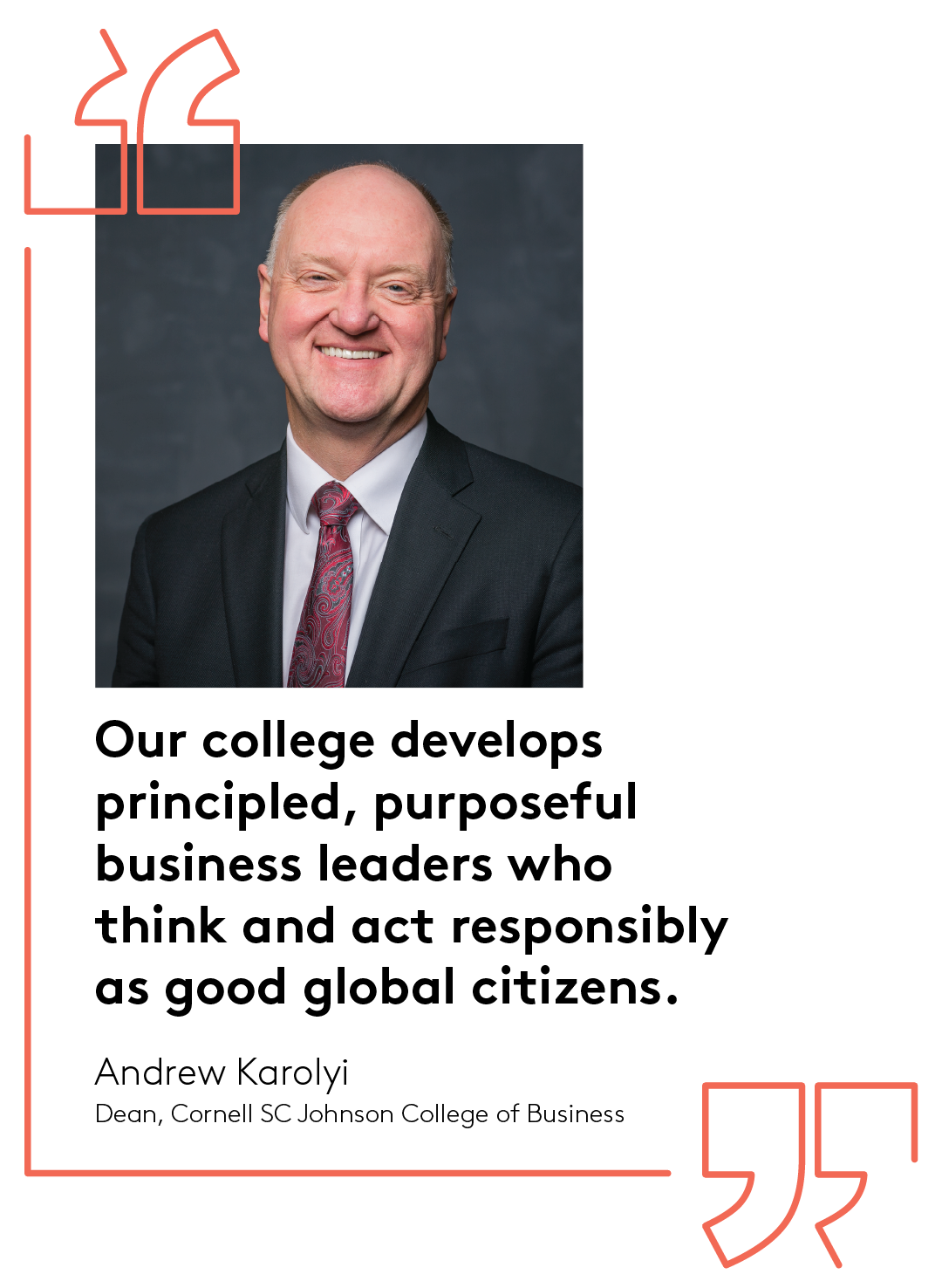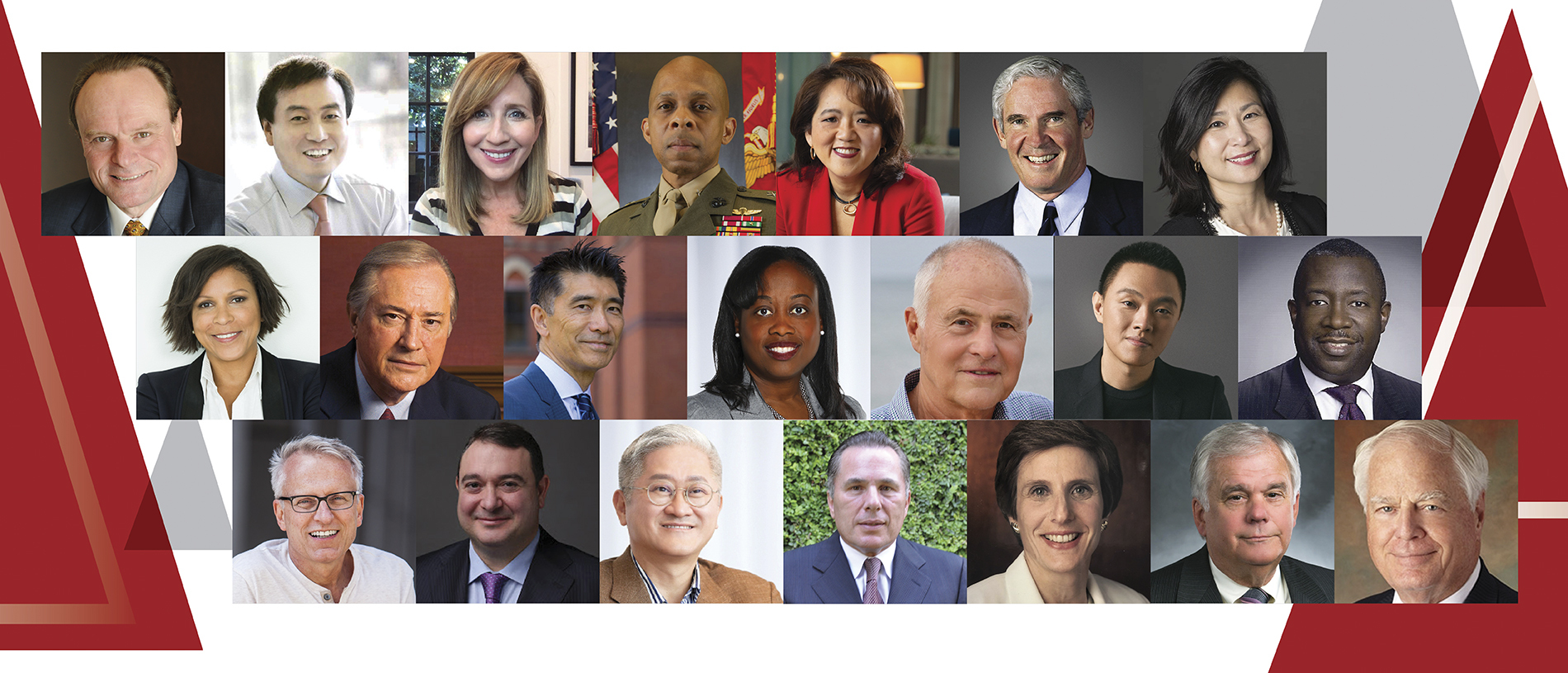Drive for 75 Term Scholarship Challenge
Invest in Johnson’s future leaders and changemakers by creating access and opportunity for a new generation at Johnson through the Drive for 75 Term Scholarship Challenge.

Johnson has transformed and inspired in countless ways throughout the past 75 years, but the scope of our impact on global business is timeless. Join us in celebrating our past, elevating our present, and igniting our future.

Invest in Johnson’s future leaders and changemakers by creating access and opportunity for a new generation at Johnson through the Drive for 75 Term Scholarship Challenge.


From the comfort of Sage Hall, our deans chat about the profound circumstances and events that have helped to shape the school.



First in Her Class
Jane Knauss Stevens was the only woman in the inaugural MBA class of 1948 and the first woman to earn a Cornell MBA. She went on to use her management expertise as a volunteer and leader for Planned Parenthood, her local government, the Cornell University Council, and numerous community and educational organizations.
Tuskegee Airman Earns Cornell MBA
Wilbur Parker ’50, MBA ’50, a World War II veteran and U.S. Army Air Corps Tuskegee Airman, became the first Black Cornell MBA graduate. Throughout his career, Parker worked to make a difference by combating racial injustice and helping others. In 1954 he became the first Black CPA in the state of New Jersey; in 1962 he broke ground as Newark’s first Black budget director; and in 1970 he became the first Black secretary of Newark’s Board of Education.
Executive Development
Dean Edward H. Litchfield initiated B&PA’s PhD program and launched the Executive Development Program in 1954. Litchfield asserted that the problems, structures, systems, and techniques of administering any organization could be scientifically identified and understood through one set of common theoretical principles, an idea that laid the foundation for the grant that launched the Sloan Program in Hospital and Health Services Administration in 1955.
Rhodes Scholar Becomes Youngest Dean
In 1962, William D. Carmichael, a 32-year-old Rhodes scholar and economist from Princeton was named the fourth dean. He focused his attention on strengthening the faculty, hiring Thomas R. Dyckman, David Ahlers, Jerome Hass, and L. Joseph Thomas—eminent researchers and scholars who, along with Hal Bierman Jr. and Sy Smidt, formed the heart of the school’s teaching faculty and thought leaders for several decades.
Foundational Expertise in Accounting
Thomas Dyckman joined the faculty in 1964 and held the title of Ann Whitney Olin Professor of Accounting and Quantitative Analysis for nearly 30 years. His interest in number crunching extended well beyond the classroom to include how human behavior affects accounting policy and investment decisions. During his two stints as acting dean, he oversaw the renovation of Sage Hall and the launch of the Parker Center for Investment Research, as well as the school’s first immersion program.
First Endowed Professorship Established
In 1965, Cornell Trustee Nicholas H. Noyes, class of 1906, established Johnson’s first endowed professorship, the Nicholas H. Noyes Professor of Management. Vrinda Kadiyali has held the professorship since 2010. This was the first of five professorships he endowed for the school over the years.
Building Community
Jerome “Jerry” Hass joined the faculty in 1967 and served as the James B. Rubin Professor of Finance. A nationally recognized expert in corporate finance, energy and regulatory policy, applied microeconomics, managerial finance, security analysis and investment management, and business strategy, his teaching was legendary. With long-time colleague Hal Bierman Jr., he co-authored An Introduction to Managerial Finance (1973). He hosted an annual graduation picnic each May on his farm.
Dean Drives Growth
Harvey J. Davidson, a 38-year-old accountant and partner in the Detroit office of Big Eight accounting firm Touche, Ross, became the school’s fifth dean in 1969. With the increasing popularity of the MBA degree, the school’s class size grew substantially during his 10-year deanship.
Leadership Matters
Nelson Schaenen Jr. ’50, MBA ’51, managing director of Weiss, Peck & Greer, was appointed to the Cornell Board of Trustees in 1971 and served for 24 years. He co-chaired the $38 million campaign to fund the renovation of Sage Hall. He was elected a Cornell Presidential Councillor in 1995 and served on the Johnson Advisory Council for 38 years. He is recognized in Johnson’s Hall of Honor and received the Samuel C. Johnson Distinguished Service Award in 2016.
Professional Expertise
In 1979, Maureen O’Hara joined the faculty. She became the first tenured female faculty member and served as the Robert W. Purcell Professor of Finance. A leader in market microstructure, she authored the classic, Market Microstructure Theory (1995). In 2002, O’Hara became the first woman to lead the American Finance Association and has since served as president of the Financial Management Association, the International Atlantic Economic Society, and the Society for Financial Studies.
Funny Business
Business school is serious; the Follies is not. The Follies variety show is the Johnson community’s annual opportunity to publicly spoof all that they know and love about Johnson. Created in 1980 by Johnson classmates Cynthia Wilson Massarsky and Barry M. Massarsky, both MBA ’81, the Follies showcases both live performances and prerecorded videos produced by students, faculty, and staff.
Access & Impact
The Black and Hispanic Graduate Business Students Association focused on ensuring members’ academic and social well-being and networking for job seekers when it launched in 1980. In 1987, the club expanded its mission to actively increase recruitment of underrepresented students.
Focusing on Business
In 1982, Dean Thomas convened an external strategic task force made up of prominent business and educational leaders, faculty, and alumni—including Samuel “Sam” C. Johnson ’50, Nelson “Nels” Schaenen Jr. ’50, MBA ’51, and Sanford “Sandy” Weill ’55—to evaluate B&PA. Their recommendation that the school focus exclusively on business and eliminate public and health administration would fundamentally change the school.
Historic Johnson Family Gift Names School
In 1984, Sam Johnson ’50 and his family donated $20 million to the school—at the time, the largest-ever gift of its kind. In honor of Johnson’s grandfather, founder of what is now SC Johnson, the school was renamed the Samuel Curtis Johnson Graduate School of Management.
New Partnerships
In 1985, Curtis W. Tarr was named the seventh dean. He came to Johnson with a Harvard MBA and PhD in history from Stanford, and an eclectic career that included a university presidency, government service and corporate leadership. He advocated an interdisciplinary approach to business education and strengthened academic relationships across the university. He would lead a capital campaign that resulted in endowed professorships, enhanced computer resources, and increased financial aid.
Pioneer of Progress
In 1989, Alan G. Merten, a professor of information systems and champion of diversity, was named the eighth dean of Johnson and the first Anne and Elmer Lindseth Dean. Under his leadership, Johnson committed to making Sage Hall its new home and launched the campaign to restore and renovate the elegant 19th century building.
Nobel Laureate Founds Research Center
The Behavioral Economics Decision Research Center was founded in 1989 by Cornell economics professor Richard Thaler, who was named a Nobel Laureate in economics in 2017. Often cited as the birthplace of behavioral economics, the interdisciplinary center was codirected by Cornell economics professor Robert H. Frank, who joined Johnson’s faculty in 1990.
Transforming Sage Hall for a Modern Education
Having outgrown Malott Hall, in 1993 Johnson undertook extensive renovations of Sage Hall and transformed it into a modern business school. An exoskeleton supported the multicolored brick walls of the Victorian Gothic structure while the building’s interior was demolished and a new building was constructed within it.
Founding Entrepreneur
Engineer, businessman, entrepreneur, and philanthropist David Duffield ’62, MBA ’64, founded PeopleSoft in 1987. He went on to launch another five companies, including Workday and Ridgeline. His broad support across the university enabled the construction of Cornell Engineering’s Duffield Hall. He was named Cornell Entrepreneur of the Year in 1996.
Immersion Brings Experience to the Forefront
Launched in 1996 under the leadership of Professor Dick Conway, the Semester in Manufacturing, introduced immersion courses at Johnson. The semester-long course combined interactive visits to manufacturing facilities and workers’ unions with lectures, discussions, and team-based projects. An innovative approach to teaching, it became a model for subsequent immersion courses.
Fast Forward Dean
Robert J. Swieringa, who had previously served as an accounting professor, returned to Johnson from the Financial Accounting Standards Board in 1997 to become the school’s ninth dean. Under his leadership, Johnson launched Fast Forward, a marketing campaign that captured the school’s spirit and growth: the school moved into its new home in Sage Hall; student enrollment grew by 60 percent; the faculty doubled from 47 to 101; and the budget tripled.
Park Fellows
The Roy H. Park Leadership Fellows program was created in 1997 to attract high-caliber MBA students with outstanding leadership potential and a commitment to service. The program is funded by the Triad Foundation, which carries on the legacy of entrepreneur Roy H. Park and is led by his son, Triad president Roy H. Park Jr., MBA ’63. Both served on the Johnson Advisory Council and as advisors and benefactors across the university.
Iconic Sage Hall New Home for Johnson
Cornell University President Hunter R. Rawlings III and Dean Swieringa presided over the formal dedication of Sage Hall as Johnson’s new home in October 1998. The weekend-long celebration brought together six Johnson deans, past and present, and more than 950 attendees. The renovation had included cleaning the building’s brickwork and its brilliant color was a surprise, even to architectural scholars.
Parker Center Brings Wall Street to Sage Hall
Named in honor of a gift from Jeffrey P. Parker ’65, MEng ’66, MBA ’70, the Parker Center for Investment Research opened with a state-of-the-art trading room in 1998 in the newly renovated Sage Hall. The student-managed Cayuga MBA Fund launched the same year with funding from the class of 1998 and a small circle of initial investors.
A First Step
The Office for Women and Minorities in Business (OWMB), now known as the Office of Diversity and Inclusion (ODI), opened in 1999. Founding director Angela Noble-Grange, MBA ’94, would later become a senior lecturer of management communication at Johnson and was honored with the 2012 Wilbur Parker Distinguished Alumni Award—presented to her by Wilbur Parker himself—in recognition of the office’s founding.
Empowering Black Student Leaders
Johnson’s Black Graduate Business Association was created in 2000 under the leadership of Marmeline Petion-Midy ’95, MBA ’00. Dedicated to recruiting students of African descent, the BGBA is committed to the professional, academic, and social development of its membership. Petion-Midy was honored with the 2019 Wilbur Parker Distinguished Alumni Award.
Serving Greater Needs
The Hispanic American Business Leaders Association (HABLA) was founded in 2003 under the leadership of Marcella Ayala, MBA ’04, to empower Latinx and Hispanic American MBA students. In 2005, Johnson received the prestigious 2005 Brillante Award for Best Educational Institution for Hispanics.
Out for Business
The Out for Business (O4B) club for lesbian, gay, bisexual, transgender, and queer (LGBTQ+) Johnson students, their partners, and active allies, was founded in 2003 to foster a positive environment, build a professional network for its members and their allies, and promote a culture of inclusion in the Johnson community and the workplaces they enter.
Synchronous Collaboration
In collaboration with Queen’s University in Kingston, Ontario, Johnson welcomed the first students to the Boardroom Executive MBA (now the Executive MBA Americas), broadcasting synchronous, interactive instruction to multiple cities from a new, state-of-the-art videoconferencing studio in Sage Hall.
A Legacy of Leadership
L. Joseph “Joe” Thomas, a popular professor of operations management at Johnson since 1967, was named the Anne and Elmer Lindseth Dean in 2008. He would lead the expansion of the executive MBA programs, launch the Emerging Markets Institute, and travel around the world to meet with alumni.
Winning Effort
In 2009, Johnson joined the Consortium for Graduate Study in Management, a nonprofit comprised of top business schools that share a commitment to promoting diversity and inclusion through admissions, recruitment, networking, and career development activities. Johnson’s Consortium students would go on to win the Consortium’s “Together Everybody Achieves More” (T.E.A.M.) trophy four times in a row.
Emerging Markets Institute
The Emerging Markets Institute was launched in 2010 as a vehicle to bring together preeminent practitioners and academics from around the world to develop the next generation of global business leaders and to create the premier research center on the role of emerging markets in the global economy.
Broadening Opportunities
Carlos R. Quintanilla, MBA ’80, received the Distinguished Latino Alumni Award in 2011 in recognition of his support of the school’s efforts in Latin America and his philanthropy in developing student scholarship opportunities. In 2014, the award was renamed the Carlos R. Quintanilla Distinguished Latino Alumni Award in his honor.
Global and Tech Focus
Soumitra Dutta was named Johnson’s 11th dean in 2012. An authority on the impact of new technology on business, and on strategies for driving growth and innovation by embracing the digital economy, he would play a key role in launching the Cornell Tech MBA program. In 2016, he became the inaugural dean of what is now the Cornell SC Johnson College of Business.
Durland Lecture Features Corporate Expertise
In 2012, Mark T. Bertolini, MBA ’84, chairman, CEO, and president of Aetna, called for restructuring the nation’s healthcare system and employing technology to make it easier to use and affordable for all when he delivered the 24th Durland Lecture, Johnson’s most prestigious speaking engagement.
Gift Establishes Family Business Initiative
A gift of $10 million established the Smith Family Business Initiative at Johnson in 2014. John Smith, MBA ’74, and his wife, Dyan Smith, funded the initiative because they believe education is key to founding and fostering family businesses across generations.
MBA for the Digital Economy
In 2014, Johnson launched the Cornell Tech MBA, a one-year MBA immersed in New York City’s tech ecosystem that fuses business, technology, innovation, and entrepreneurship in a fast-paced, hands-on learning environment. The program has been located on the Cornell Tech campus on Roosevelt Island since 2017.
Tsinghua Partnership Provides Bilingual Experience
In partnership with Tsinghua University’s PBC School of Finance, Johnson welcomed its inaugural students to the dual degree MBA and Finance MBA in 2015. The two-year program is the only part-time, post-experience program conducted bilingually in English and Mandarin, and it is geared to attract corporate and organizational leaders across China and beyond.
Nelson Named Dean
In 2016, Mark W. Nelson, an accounting professor at Johnson since 1990 and former associate dean for academic affairs, was named the 12th dean. He would oversee the opening of the Breazzano Family Center for Business Education and the Tata Innovation Center on the Cornell Tech campus, the launch of new degree programs, and Johnson’s incorporation into the Cornell SC Johnson College of Business. He would also lead the school’s response to the COVID-19 pandemic.
Three Schools, One College
On July 1, 2016, Cornell University established the Cornell College of Business, integrating
Cornell’s three accredited business programs. The college encompasses the Samuel Curtis Johnson Graduate School of Management, the Charles H. Dyson School of Applied Economics and Management, and the Cornell Peter and Stephanie Nolan School of Hotel Administration.
Specialized Master’s
The first Master of Professional Studies program was introduced in 2017. The MPS in Management-Accounting Specialization was designed to provide students who have a non-business undergraduate degree and a business minor, or its equivalent, with a rigorous business management education. The program received STEM designation in 2019.
A New College Leader
Andrew Karolyi, Harold Bierman Jr. Distinguished Professor, professor of finance, and associate dean for academic affairs at Johnson, was named deputy dean and dean of academic affairs for the Cornell SC Johnson College of Business in 2018. He would go on to be named dean of the college in 2021 and in 2022, in recognition of a gift from Joanne Knight in memory of her husband, Karolyi became the inaugural Charles Field Knight Dean of the Cornell SC Johnson College of Business.
Going Online with eCornell
The online, STEM-certified Master of Science in Business Analytics, offered in collaboration with eCornell, was introduced in 2021. The 16-month degree program is designed for working professionals who seek to build a career in analytics and apply the tools of data science to real problems and real data.

Meet Johnson alumni who have contributed to the success and sustainability of our school.

Save the date! Johnson’s Big Red Bash will be held May 5, 2022. Big Red Bash 2022 will celebrate alumni excellence and scholarship in New York City, the hub of global business.
Join the conversation about 75 historic years at Johnson.
